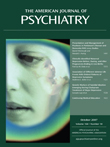Abstract
Objective: The purpose of this study was to evaluate the efficacy and safety of olanzapine for the treatment of acute manic or mixed episodes associated with bipolar disorder in adolescents. Method: A 3-week multicenter, parallel, double-blind, randomized placebo-controlled trial was conducted at 24 sites in the United States and two sites in Puerto Rico. The participants were outpatient and inpatient male and female adolescents 13–17 years of age with an acute manic or mixed episode. Subjects received either olanzapine (2.5–20 mg/day [N=107]) or placebo (N=54). The mean change from baseline to endpoint in the Young Mania Rating Scale total score was the primary outcome measure. Results: The mean baseline-to-endpoint change in the Young Mania Rating Scale total score was significantly greater for patients receiving olanzapine relative to patients receiving placebo, and a greater proportion of olanzapine-treated patients met response and remission criteria (44.8% versus 18.5% and 35.2% versus 11.1%, respectively). The mean baseline-to-endpoint weight change was significantly greater for patients receiving olanzapine relative to patients receiving placebo (3.7 kg versus 0.3 kg), and the incidence of treatment-emergent weight gain ≥7% of baseline was higher for olanzapine-treated patients (41.9% versus 1.9%). The mean baseline-to-endpoint changes in prolactin, fasting glucose, fasting total cholesterol, uric acid, and the hepatic enzymes aspartate transaminase and alanine transaminase were significantly greater in patients treated with olanzapine relative to patients receiving placebo. Conclusions: Olanzapine was effective in the treatment of bipolar mania in adolescent patients. Patients treated with olanzapine, however, had significantly greater weight gain and increases in the levels of hepatic enzymes, prolactin, fasting glucose, fasting total cholesterol, and uric acid.



